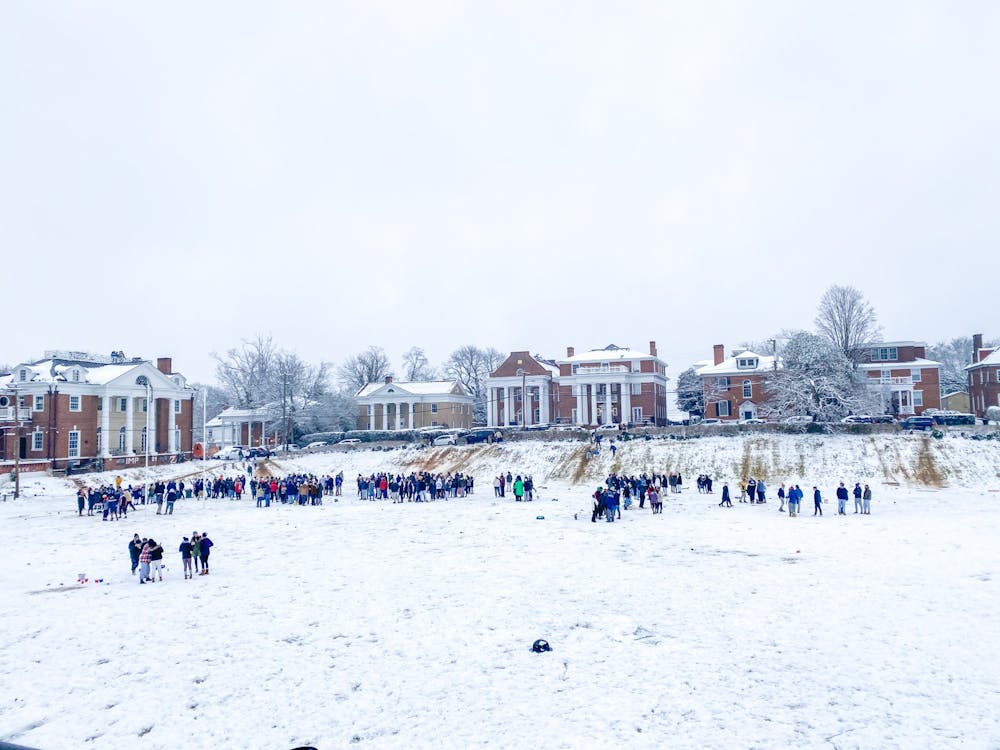Lea en español
Late last month, the Inter-Sorority Council and Inter-Fraternity Council announced that a previous ban on in-person Greek Life gatherings would be reversed ahead of formal recruitment and bid day events. The IFC said that it will allow later rounds of recruitment and bid day events while the ISC will limit chapters to only hosting reduced capacity in-person bid days. Despite claims from the IFC president that “the Greek community stepped up huge [last] semester and showed that they were willing to sacrifice the parties” to protect public safety, the reversal of this policy will exacerbate the spread of COVID-19 and recklessly endanger our community.
We have been down this road before, and we know how this ends. As seen last spring, summer and fall, the Greek community was not, in fact, “stepp[ing] up huge” or “willing to sacrifice the parties” to protect the community — no matter what face-saving propaganda the IFC is spouting at us. Even now, as we begin our third semester of the pandemic, student compliance is questionable at best. Just last weekend, large numbers of students gathered in the snow at Madison Bowl — many without masks and none observing proper distancing. Dozens more waited in closely packed lines outside of Corner bars. The IFC and ISC — like the University itself — should be doubling-down on restrictions, not lifting them.
The announcement of the policy reversal contains major causes for concern. First, the policy’s stipulation that all in-person events must be approved and regulated by the IFC and ISC only covers formal events. This means that informal gatherings — a hallmark of fraternity rush — remain unregulated. As evident by their behavior over the last year, we cannot trust that fraternities will refrain from holding in-person, informal and unregulated gatherings.
In an attempt to account for this policy gap, the IFC has established a task force of five members per chapter and charged them with enforcing COVID-19 policies in their respective organization. If one of these five members observes an “egregious violation” in their chapter, they must report it to the IFC for adjudication. In essence, the system only works if brothers report fellow brothers for infractions. It is hard to understate how naive it is to believe a system of this sort would work. Brothers have no incentive to report their peers and could face social ostracization in their chapter for doing so. The very purpose of a fraternity is supposed to be brotherhood over all else — why would anyone expect them to break it? Repeated University sanctions for alcohol and drug abuse, hazing violations and sexual assault show that while brothers could hold one another accountable, they choose not to.
The IFC and ISC reversing their ban on in-person gatherings is selfishly endangering our community — plain and simple. New cases in Virginia — while falling — remain at near-peak levels. The University Medical System, which serves not only the Charlottesville community but a wide swath of Central Virginia, is near capacity and critically short-staffed. The pandemic remains at a level that mandates only the most essential services and events be held in-person. It might come as a shock to the “stepped up huge” Greek community, but recruitment and bid day are not essential and can be conducted online. Our community, our Commonwealth and our country are all suffering and must all make sacrifices to support one another. It is a stunningly self-absorbed and sadly unsurprising move for the Greek community to act as though it is exempt from this ethical responsibility.
I have previously written on the importance of autonomy in student self-governance. I am always skeptical and hesitant about University interference in the right of students to govern our own affairs. I am not, however, skeptical or hesitant when I say this — the University administration must intervene and ban in-person Greek Life gatherings. It would not be unprecedented for it to do so — all Greek Life activities were suspended in the wake of the 2014 Rolling Stone scandal. It is morally wrong — not “Great and Good” — to allow the IFC and ISC to endanger community members in this way. I have said it before, and I will say it again — the University must rein in the social anarchy of Greek Life. The stakes are too high. Lives are on the line.
Noah Strike is an Opinion Columnist for The Cavalier Daily. He can be reached at opinion@cavalierdaily.com.
The opinions expressed in this column are not necessarily those of The Cavalier Daily. Columns represent the views of the authors alone.







